August 1, 2009
Beef Burgundy and Sweltering
The weather this summer is really just unfair. It’s been over 100 degrees for more than 40 days this summer here in Austin, and that’s just miserable, unless you’re a huge bug. And believe me, when it’s this hot for this long, the huge bugs love it — and they’re so excited about it that they want to bang on your sliding glass door to tell you about it. One massive roach was so insistent about getting in — I really think it was trying to slide the door open — and the noise was so aggressive that I wanted to go out and kill the damn thing, but I don’t own a gun. Meanwhile, it hasn’t broken 90 degrees in New York, where it should smell of braised urine by now, but it’s instead been cool (but rainy). It’s like the Northeast has sent all of their degrees down here. I love cool weather. To me, 68 degrees is perfect. Hell, give me 60 degrees and I’ll bust out the sweaters. But 106? Not pleasant. I hate sweating. It’s awful for my hair. I now understand why most of our Austin friends vanish from town for the summer. We need to figure out a way to do the same next year.
The weather has done some interesting things to the light outside. Everything turned pink a few nights ago at dusk. I couldn’t quite capture the pink, but here’s a shot of the sky.
When it’s this hot, the deer all seek shelter under the trees in our back yard. The other day, there were no fewer than 10 deer in our yard. This shot only captures six of them, but you get the idea. We love the deer.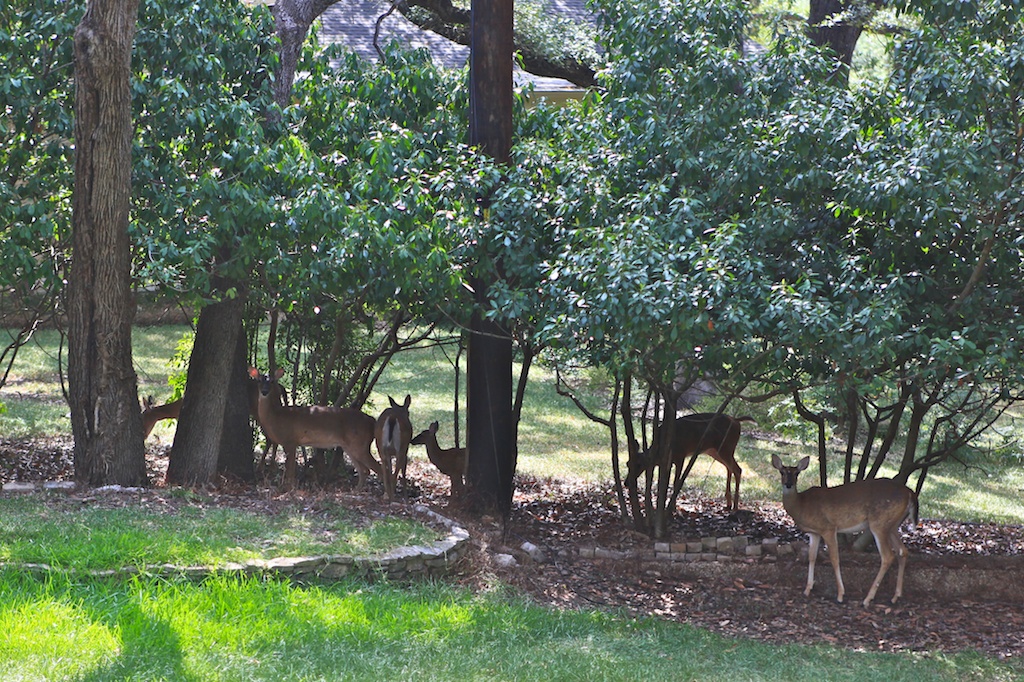
Sometimes they peer longingly into my air conditioned studio.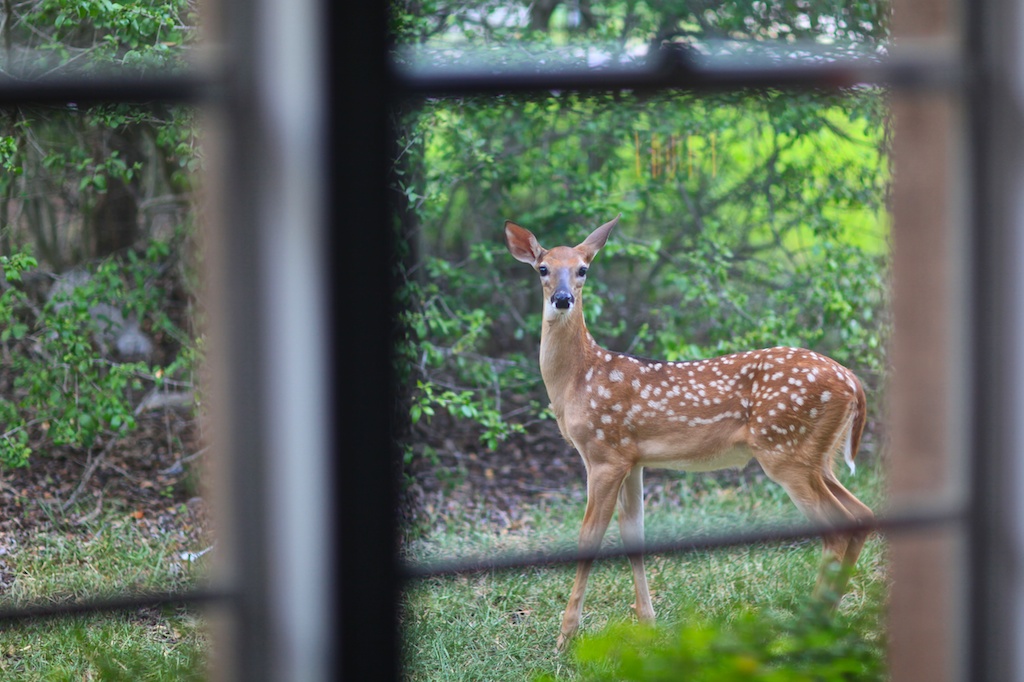
On the music front, I’ve been working on the trombone concerto, but most of it is still just “background processing.” Part of the problem is that I do my best work when I go running outside, but it’s too hot to do that right now. I go running on the treadmill at the gym, but the rhythmic noise of the treadmill is too distracting to do any real composing.
I did get some administrative work done this week. This tends to be a very busy time of year, with directors placing their orders for early fall, and fortunately, that trend is continuing this year. I was worried that with the awful economy, nobody would order music, but so far, so good, although admittedly none of these orders are coming from the broke state of California. I’ve added the confirmed performances to the Performance List.
Earlier this week, AEJ and I made beef burgundy, or, if you’re being all chichi-la-la, Bouef Bourguignon. (What’s better, when it’s 106 degrees outside, than beef stew?) We’ve made this several times using the recipe in the Cooks Illustrated cookbook, but this time we tried Ina Garten’s recipe from her cookbook.
We love Ina Garten’s recipes. We’ve probably made a half-dozen now, and every one has been just delicious and reasonably easy, unlike, say, Alton Brown’s mac & cheese recipe, which calls for tempering an egg — WTF, Alton? — and ends up tasting like onion-flavored stinky cheese.
Ina’s recipe for beef burgundy is supposed to cook for much less time than the one from Cooks Illustrated — 75 minutes vs. 3 hours — but in truth, we had to cook it for two hours to get the beef tender enough. Whereas the Cooks Illustrated recipe uses a bouquet garni (the chichi-la-la term for “bag full of vegetables and herbs that you remove prior to serving”), Ina leaves everything in the pot so you can actually eat it. I prefer it this way, since not much is tastier than carrots that have cooked in wine and beef juice for two hours. Here’s a shot of the carrots and onion, browning in beef and bacon fat. (Again, how could this not be good?)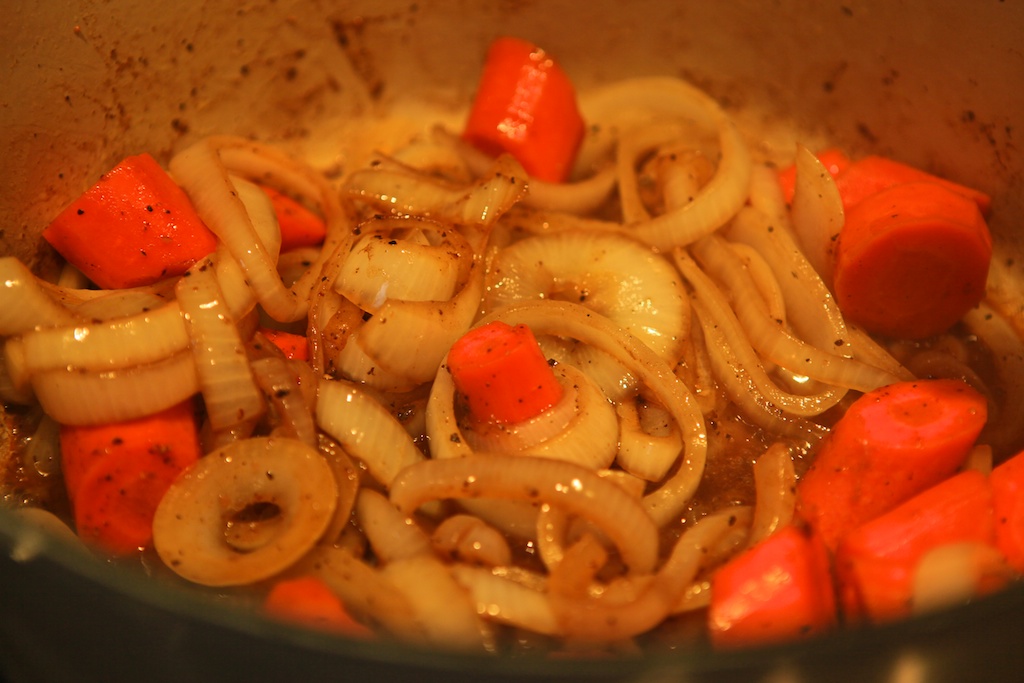
Ina’s recipe also calls for cognac.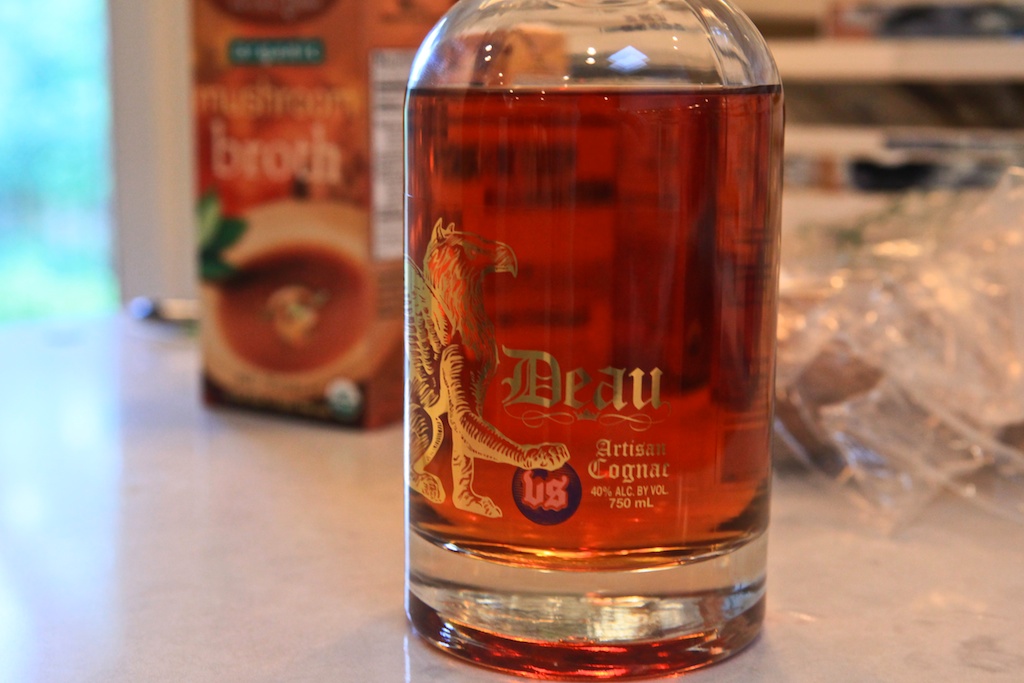
Before adding a full bottle of red wine (burgundy is the intended wine, since that’s the name of the recipe, but at $30 for a cheap bottle, we used something less fancy-pants), you first add the cognac — and you light that bitch on fire. “Stand back!,” Ina warns in the recipe, and she isn’t kidding. The flames shot up probably two feet.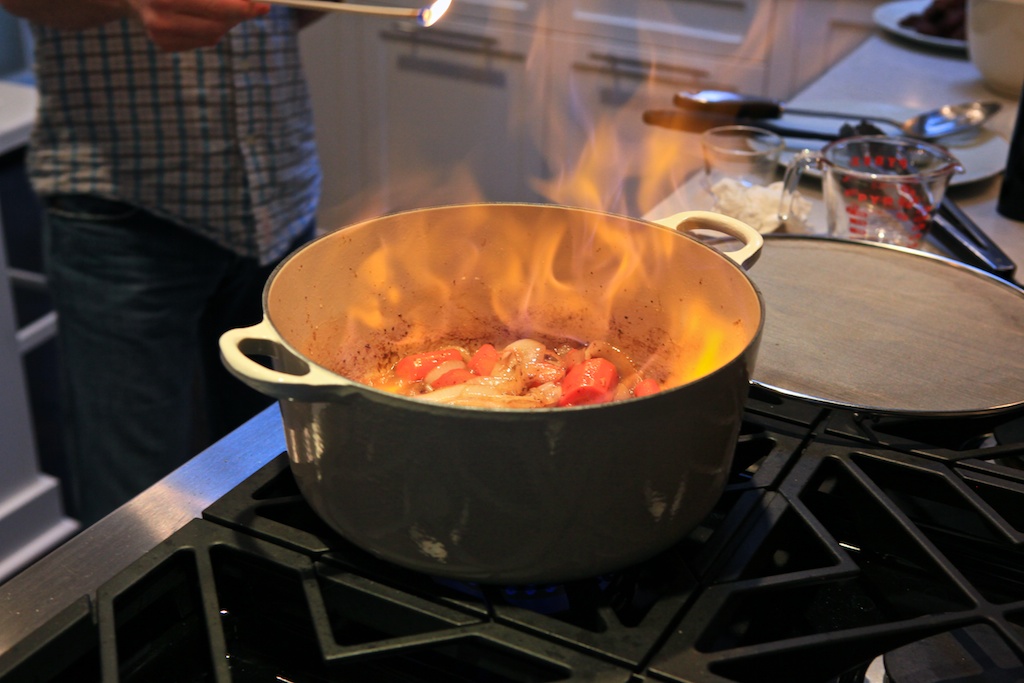
It burned for a surprisingly long time. You can see that some of the onion is slightly charred from the cognac flames.
Here it is after braising for two hours. The onion slices had almost entirely disintegrated into the gravy. (Pearl onions are added at the end in their place.)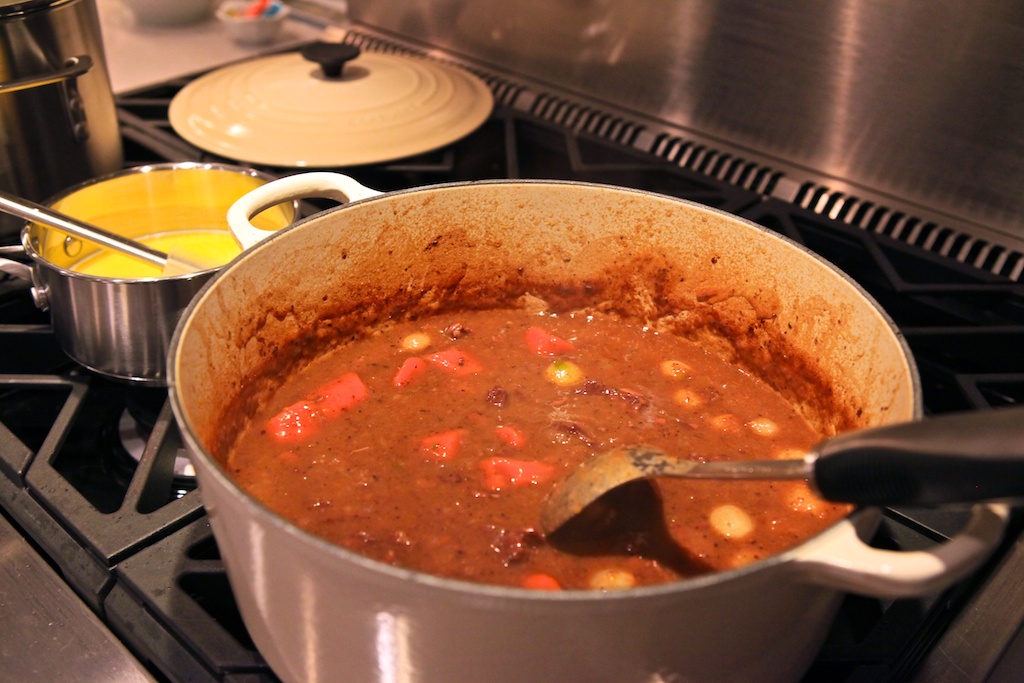
Here’s the finished dish, served atop AEJ’s mashed potatoes (using the recipe from Union Square Cafe in New York — I swear to you, these are the best mashed potatoes I have ever had. You need a potato ricer, but the flavor and texture is insane, and how can it not be with a stick of good butter, a half cup of organic heavy cream, and a half cup of organic whole milk?).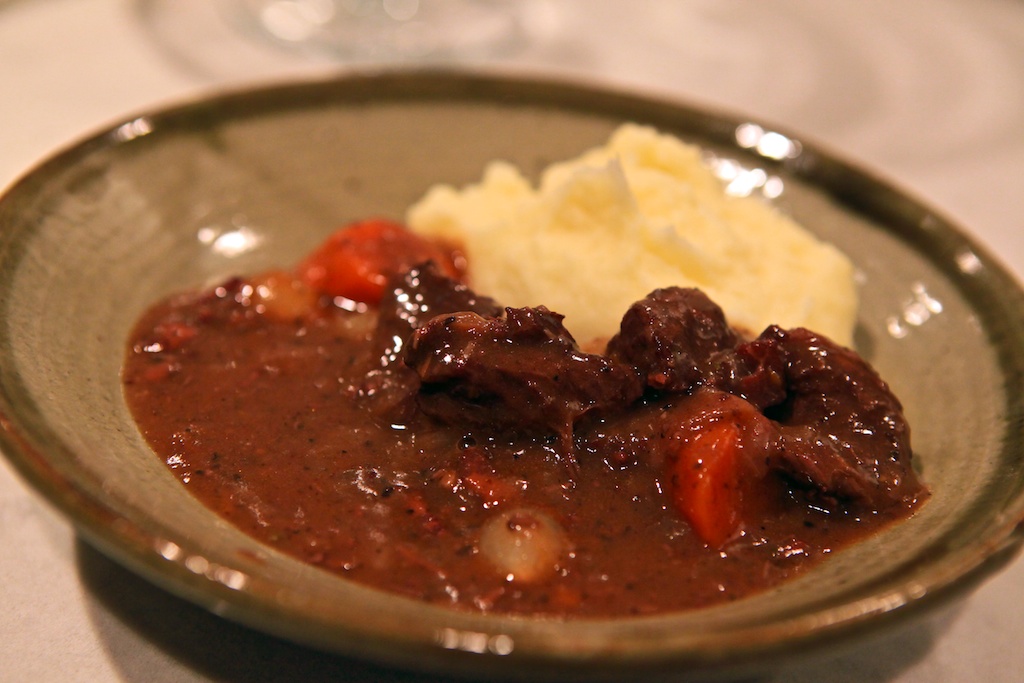
What to cook next? Well, tomorrow is Sunday, so I think pancakes are in order. I hope AEJ is reading this, since she’s the one who makes the pancakes… Hint… hint…
July 26, 2009
Music Publishing
When I talk to composers who are still in college, a lot of them are of the belief that the big goal for a composer is to become published. “How did you get your first piece published?” they want to know. “I want to publish my new percussion ensemble piece. Where should I send it?” Oh man, what a kettle-o-fish this is. I tend to be overly opinionated when I speak to student composers about anything, and I’m worse about this topic than just about any other. Below is what I tell them. This post is going to be mega-wonky, and if you’re not interested in the business side of being a composer (or you think “business” and “composer” should never go in the same sentence together), you should skip this entry.
When I was really young — high school age — I thought it would be amazing to be published. My dream was to be published by G. Schirmer, because that was Samuel Barber‘s publisher, and Barber was my favorite composer. (They currently publish John Corigliano — my teacher at Juilliard — Bright Sheng, Tan Dun (one of my favorite composers), David Lang, and their various divisions handle Eric Whitacre, the young composer Nico Muhly… the list goes on and on.) I figured that if I could be published by Schirmer some day, their stamp of legitimacy would mean that I was a Real Composer, and people would climb over each other to play my music! It was a perfect plan!
I never actually submitted any material to Schirmer, though, or to any other publisher. When I was 19, I got a commission to write an orchestra piece for the Cleveland Orchestra Youth Orchestra, and I learned that if I joined a performance rights organization like ASCAP, I could collect performance royalties for that performance. But here’s the thing… If you have a performance that is licensed by ASCAP (just about every live music performance of “classical” music is licensed — and therefore paid), the composer gets 50% of that performance royalty. Who gets the other 50%? The publisher.
I didn’t want 50% of the performance earnings go into the ether since I wasn’t published, so I registered a publishing company with ASCAP — Osti Music. (I came up with the name “Osti Music” because when I first sent music to John Corigliano, he complained that my music had way too many ostinatos, or, repeated phrases. Clearly, not much has changed.) I became both a writer and publisher member of ASCAP, and I copyrighted that first orchestra piece with the Library of Congress under the publisher name Osti Music. Eventually I got an ASCAP check for the performance royalties for that premiere performance — my writer royalty check. Then, a few weeks later, I got another (equally tiny) check, for the same amount — my publisher check.
This is an important thing to remember: a publisher gets 50% of just about everything (not just performance royalties — they get half of CD royalties, half of DVD royalties, half of music rental fees, and half of all license fees, like marching band licenses), and they own the copyright. The composer does not own the copyright; the publisher does. That means the publisher controls all of the rights for the music. Yes, they give half of the earnings to the composer, but they also call the shots.
Let’s say that you write a piece that’s very personal to you — for the sake of this example, we’ll say it’s a choral piece that you wrote for a close friend. Your publisher, who owns the copyright, is contacted by disgraced beauty queen and breast-implant recipient Carrie Prejean, who, fresh from her successful performance at the Del Mar Racetrack, has decided to record an album about the evils of the homosexual lifestyle, and has requested permission to sample your choral piece in her first single. Your publisher, seeing dollar signs, agrees. You, who are so liberal that you think even straight people should have to get gay married (if nothing else because the weddings would be FABulous!!!), are horrified — but powerless, because you don’t own the copyright. If you self-published your choral piece, though, you could prevent this.
What does a publisher do for you? I mean, what do you get for that 50% that they keep? It depends on lots of things, like the size of the publisher, and the number of composers they represent. (It goes to reason that if a publisher handles a lot of composers, not everybody will get the same amount of attention. If you publish only only one person — yourself — there’s no shortage of attention.) A major publisher who is enthusiastic about one of their composers can definitely help that composer to gain exposure and potentially help to secure performances. The publisher can pick up the phone, call the Artistic Administrator of the Chicago Symphony, and say, “we have a great new piece by Jonathan Newman. You guys should give it a look” — and the orchestra might actually give the piece a look. If I, on the other hand, send a piece to the Chicago Symphony, they won’t care. (Trust me; I’ve tried it. But that touches on the whole “band vs. orchestra” thing that I’ve blogged about before.) Orchestras get stacks of unsolicited pieces every year. Why would they look at a piece by a composer they haven’t heard of, particularly when they play essentially no music by living composers anyway? There’s something to be said for having a trusted middle man like a major publisher. Publishers also negotiate contracts (commission contracts, license fees, etc.) and maybe most importantly, they print the music and get it into the hands of retailers and performers.
The Internets have made a lot of this very easy to do on your own, and I would argue that with a lot of work and some luck, you can do fine professionally, and much better financially, without a publisher. Can you put up a website with score and audio samples? Yes, and that’s already more than most publishers would do for you. Can you attend music conventions and promote yourself and your music? Again, yes, and since you only have yourself to promote, you can do this more efficiently than a publisher who is at the convention pushing 60 different composers.
Can you print the music yourself? Of course you can. I still print every “Strange Humors” score, and all of the sets of my chamber music, myself. It’s a hassle to print each set, then fold those parts in half, then staple them, then ship them, but here’s the difference: publishers keep 50% of royalties, but if a composer is published and the printed music is sold, the composer will see 10% of the retail price.
I’ll say that again. If you are a published composer, you keep 10% of the list price on a set of music. When I told this to somebody in Hollywood once, the reaction was, “wait, that’s backwards. The agent gets 10%; you get 90%.” Not in music publishing. A very established composer might get a great deal and see 12% or maybe even 15%, but that’s unusual. Granted, the publisher doesn’t get all of the other 90%. The music store keeps 40-50% of it. But the fact is that if you publish a piece through a standard publisher and the retail price is $10, the music store gets $5, the publisher gets $4, and the composer receives $1. But if you’re self published and you sell the sheet music directly (rather than through a music store), you get the full $10. Even if you sell it through a music store, you’ll see $5, which even by my music-school-level math education, is better than $1.
Is that difference of 400%-900% worth the time it takes to print, fold, staple, and mail a set of parts? To me, the answer is yes, but to a lot of composers, the answer is no. All of this takes a lot of time, and a lot of composers, understandably, would rather just compose and not worry about the business aspect of it. They just want to write the music, give it to a publisher, and not think about it anymore, and whatever income they collect, no matter the amount, is just a nice bonus. Most of those composers probably have other jobs — like teaching — or wealthy families to make that possible. I like to think of it like I also have a “day job,” and my day job is publishing my own music.
The biggest challenge is running the business side and still finding time to do the most important part, which is to write the music itself. Speaking of that — I have some work to do.
View Comments
Comments
Amen. I think you can't stress the copyright aspect enough. Another consequence of giving up copyright is that the composer would then have to get permission to arrange / transcribe his or her own work! I find that surreal. The thought that anyone else could determine how your music is used, or even whether you were allowed to reuse or reshape it, is utterly unacceptable to me. Even if a publisher approached me with some amazing $$ deal, I would never consider it unless I retained copyright control.
But maybe I'm just a control freak?
Well that answers 3/4 of my publishing questions.
Now, to find a format that actually makes my music readable on Finale. I might try a larger paper size.
John, you are a funny guy. One of these days we gotta get together for drinks or something.
Mark, I'm a big fan of ledger-size paper (11" x 17") for larger ensemble works. Staff sizes can be quite small but are still legible on paper that size.
As per Jonathan Newman's suggestion, I've started making parts to music at a custom size of 11" x 14". The parts are prepared by being printed on ledger size paper, and then the excess is cut off.
Beauty part of ledger paper is that it's easily available at any office supply store worth their salt, in a variety of stocks and weights.
Not to sound like a shill for them, but Staples carries ledger paper in regular, card, and cover stock, and can print, bind, and cut scores and parts quite cheaply. Only thing is you kind of have to coach them about score production, since they aren't musically inclined.
I think it's a great idea to have complete control of your music, as long as you have the time for the business aspects.
Some composition competitions have a monetary award coupled with a publishing offer. Would you stay away from competitions like this? It seems like it would be rude to turn down the publishing offer in favor of doing the publishing yourself (and in some cases it might violate the terms of the competition).
Thank you John for this entertaining and truthful post. I went the same route myself a couple of years ago - I even bought back most of my works from my publisher so I could start self-publishing. And along the way I've picked up many other composers' pieces where (as you said) they are happy to leave the printing, shipping and distribution headaches to me. But I split 50/50 with them, not 90/10.
The Interwebs is fundamentally changing publishing as we speak! Now if we can just whittle down that 50% the distributors want...
Now that made sense! So, I guess all of the band pieces I've written but haven't bothered to try to shop around to various publishers can just be considered "self-published!" And it's not like the stuff I do have published is bringing in the bucks (or sales...).
Think if I email Corigliano he'll say something derogatory about my music that I can transmute into a good ASCAP publisher name?
Damn indecisiveness.
Hi mr Mackey,
I was just about to try to get a piece published (if anyone would even want to anyway) and i happen to chance upon your blog.
Initially i was afraid that if i did it myself, it would not be performed ever, however, i guess that opportunities can be chanced upon of or created!
thanks for this mega-wonky but informative entry!!
I'd be interested in hearing your decision to offer some pieces for rental only: http://ostimusic.com/Prices.html
What factors go into that decision?
Cheers,
Robert
People, what about publishing like this:
http://www.youtube.com/watch_popup?v=Ug7habCJrkk#t=18
on the internet?
people can see the score but not print it, then they'll have to ask you for rental/sale.
This may be good way to make your way through the new technology's era, who knows, without uploading a PDF that *everyone can print*.
But surely this is not intended for large ensembles who would result in bad quality video.
Thanks John.
I've had many conversations about this.
It has been my understanding that performance royalty income (collected through performance rights societies) exceeds proceeds from printed sheet music. Please correct me if I'm wrong. (It could also depend on the type of music, for example choral music vs. orchestral rentals vs. chamber music.) I would enjoy more details on that.
As a self-publisher how to handle the 9x12 or Octavo sizes for sheet music?
As a composer I was told this same information but never as complete and convincing as in this article. One should get involved in the business as well to gain as much possible from your music!
John,
Reread this at a time that I needed to. Publishers also make odd requests. Recently one told me they would consider publishing the new work, but they wanted a loud ending. I disagree, totally, it is fine the way I struggled with it as I continued its architecture. So no publishing....big problem for me....how to promote my music to the expected audience for it. That can be costly. Would be cool if you talk about this. Your ability to network is stunning.
Ciao!
Keep on creating!
You guys....you talk about "self" publishing. So what does that entail?....calling up a serious tv show or symphony and ask them to play it? That is a one in a million shot. Giving up the 50% is way worth it. Go for non-exclusive deals. Hell, go even for exclusive deals. You need someone working on your behalf! Life is short. You can't hold out thinking you are the next Beethoven. Jeezus! Get any exposure you can while you can!
John,
Wow, that really changed my aspect on self-publishing. Great post! I did not know how greedy the publishers were. And think, I showed a publisher some of my music at Midwest this year. Your post, my friend Zach Plata, and Steven Bryant's video on self-publishing makes it actually seem alot more creative. I am also a painter besides composing, and when I submitted a score to a publisher with my design on it, they would not publish it till I took it off. The only problem with self publishing is the copyright. Is it hard to do that with Congress?
Thank,
Richard
John,
Great post! As a 19-year-old composer who is starting to write good enough stuff to try to sell, I want to see all my options, and this definitely sounds like a good one. While I hate selling myself and running around telling everyone, "My music is awesome," I think that the physical aspect of assembling a score would be great during my creative troughs and enable me to make more money in the future.
However, I do have a few questions...
Where can I go for help in prettying up a score and its parts? I have Finale right now, though I'm debating switching to Sibelius. I KNOW I need to use a bigger paper size, though I'm having trouble with formatting.
What do people expect in terms of audio sample quality on a website? Professionally recorded in a studio, midi, or somewhere in between?
What is expected in terms of self-published scores?
What's the best way to self-promote concert works? I write comfortably for band, orchestra, and other ensembles.
How expensive is it to copyright with the government? Is it cheap enough that anyone could do it, including a poor college student?
I know that's a lot of questions, but I'm new to the industry and newly an ASCAPer, so I'm trying to learn as much as I can.
Again, great post, and thanks for the explanations.
Hi John - great article on self-publishing! I came across it via the ChoralNet site. There's much debate about this subject on there at the moment so your advice, as someone who has gone down that road and is obviously succeeding, is much appreciated!
Regards - Dorian Kelly
It's great that you've shared this informtation, especially for those of us that are aspiring working composers. It make the best choice very obvious, I do have a couple of very brief questions:
I know now that financially, being self published makes a vast difference as opposed to being published by a larger company. But is being self-published more fun? I know it brings a lot more freedom.
and lastly, how much harder is it to be noticed and to have your music promoted?
A huge thanks from Australia! This article is really helpful as I embark on self-publishing my music for schools.
Thanks again!
Right on John! After some of my band music was published by several prominent companies out of New York and elsewhere some years ago which brought me a small measure of notoriety in the band world I had the following "enlightenment:"
A famous university commissioned me to make a new arrangement of the Star Spangled Banner. At a very prominent performance at a major music convention by the band, three publisher's "reps" accosted me to get ahold of the arrangement. Before being stupid enough to select one of the publishers, On the spot I sold 4 copies of the piece for 25 bucks each. Then gave it to a prominent publisher who sold about a hundred copies (+/-) at 6 bucks a copy. My first royalty check @ 10% of the selling price came to about 60 bucks. BUT I MADE 100 BUCKS selling it myself!!
I think the argument for publishing your own music - is definitely the way to go.
When a publisher takes the rights in your song - you're immediately competing against thousands - sometimes hundreds of thousands of songs already in their catalog.
A few years ago - the notion of starting your own music publishing would have been out of the question for lots of people - mainly because of costs (office, staff, general overheads). The really good news today - is that digital has annihilated overheads so you can reach organizations anywhere in the world. I know lots of songwriters (producers & manager, too!) licensing music globally from their garage and studio basement - by sub publishing to companies (and sub licensing their recordings, too) around the world - France, Germany, Italy, Australia, South America and so on. Remember, you own the rights in your songs - throughout the world. Anyone with a computer and internet, can make a lot of headway.
I started composing 49 years ago. I even took 1997 off just to write music. altogether, I have had 36 music publishing contracts. Guess how much money I've made off these contracts? $36. I've made a lot more self-publishing.
Add comment
July 20, 2009
Trombone Concerto concept
I know it’s been awhile, and it seems like all that’s happening here is home remodeling, but but it’s time to get back to work and write some music. It appears that the funding is coming together after all, so the next big project will be the Trombone Concerto that I’m writing for Joseph Alessi, principal trombonist for the NY Philharmonic. Joe will premiere the piece with the band at West Point, and also with the Ridgewood Concert Band in New Jersey. Where he’ll take it after that, I don’t know, but I guess it depends largely on whether he likes it. The piece is commissioned by 20 high school, college, and military bands, so it should (hopefully) get a lot of play over the next 18 months. Step one, though, is to write the thing.
AEJ and I have been working on the overarching concept for the concerto, and I think we have a great idea. (AEJ was the one who conceptualized the Sax Concerto’s structure, and we collaborate on all of my pieces. She also comes up with titles for almost all of them — Aurora Awakes, Kingfishers Catch Fire, and on and on. And when I say “we” have a great idea for this concerto, what I mean is “she came up with a great idea, and I’m going to use it.”)
The piece will be based on the dual nature of the Greek god Dionysus. As the god of the vine, Dionysus is famous for the ecstasy he could inspire, but he was also subjected to a cycle of agonizing death before glorious rebirth each year, analogous to the harsh pruning and long winter the vines endure before blooming again in the spring.
The concerto’s movements would represent this duality. The first movement would be brutal, with the god’s agonizing cries as he’s torn to shreds by his own worshippers. (AEJ suggested that these worshippers might be represented by the trombone section, with their voices sounding like a fiendish parody of the soloist. I love this idea — and of course, it’s not my idea.) This brutal agony would be followed by the stillness of death (either as a slow central movement, or possibly just an extended ending section of that first movement; I’d see how this was pacing itself before making this decision). The final movement would represent Dionysus’s glorious rebirth, as he rises again, bringing the ecstasy and liberation that have been celebrated in his name for centuries.
There are all sorts of strong directions this could take, with Dionysus being not only the god of wine, but also the god of theater, grapes, ritual madness, and ecstasy. It’s a crazy combination. I should call the movements “Ecstasy,” “Ritual Madness,” and “Grapes.” Then again, maybe not, but “Ritual Madness” ain’t bad.
So the overall idea is that Joe Alessi represents a Greek god — one who is brutally destroyed in the first movement only to be reborn — with incredible joy and beauty — by the end of the concerto. The first movement would be harsh, angular, and energetic, sort of along the lines of a mini-Rite of Spring. The middle would be melancholy and still and (probably) mostly quiet. This middle section would either come from the first movement, or lead like a huge transition directly into the third section. (This is a big question — is it one straight-through piece, or two movements, or three? There are three “big picture” ideas I want to evoke, but how are they broken up?) The final section would be an arching explosion of joy — along the lines of the second movement of “Aurora Awakes.”
What’s better than portraying Joe Alessi, arguably the greatest American trombone player ever, as a Greek god?! This concept would allow for an almost operatic treatment of the trombone — something that’s really appealing to me. Here is this god who is initially strong, only to be destroyed and then come back stronger and more beautiful than before.
I’m loving AEJ’s idea. Now I need to give it some thought to figure out how to put it all together. Three movements? Two? Which movement should I start writing first? Should the entire piece by cyclical, sharing material between the beginning and end of the piece, but giving the material completely different treatment each time? My first though on that question is “yes.” Does this mean I should write the last movement first? Maybe.
And just because it doesn’t feel like a blog entry without a photograph, no matter how random, here’s a picture of Loki in his beanbag, taken with the 85mm f/1.2 L lens. I think this might be for Loki’s Christian music album cover.
View Comments
Comments
Good luck with the new piece. You guys make an amazing team! It's *very* cool to read about how you collaborate.
I know you're nowhere near titling the piece--but if you want public schools to buy it, you probably want to avoid titles "Ecstasy" and "Ritual Madness." After writing/editing textbooks for over 15 years, I'm sadly aware of taboo words/subject areas that make a product unbuyable with public funds in places like Texas and the bible belt. It is ridiculous but true. . .
1. I hate you even more.
2. Does AEJ have a sister?
3. The concept sounds amazing. I am super jealous this.
The concept sounds fantastic. If you haven't already, you should listen to the concerto Christopher Rouse wrote for Joe Alessi. The second movement has some pretty brutal sounding writing for the soloist vs. the trombone section. I am extremely excited to hear your piece.
John, on the road right now. Very exciting. I want to email you some stuff. I don't have your email with me. Please email me your email address. Thanks Joe Alessi
Let's try this again with my name spelled correctly
John, on the road right now. Very exciting. I want to email you some stuff. I don’t have your email with me. Please email me your email address. Thanks Joe Alessi
Hi John,
I'm one of the trombonists over at Cabrillo from a few summers ago. Hoping we can play a piece of yours again there soon. I stumbled upon this blog entry from a link someplace else and I'm very excited to hear you're writing a trombone concerto for Joe--I know it will be a great addition to the repertoire.
I'd thought I'd let you know that we Cabrillo folks have gotten the Grand Rapids Symphony to program Red Line Tango for the coming season--you can see it here: http://www.grsymphony.org/events/concerts/beethovens-fifth-symmphony/
Hope all is well, and I look forward to seeing you at Cabrillo sometime again in the future!
Dan Mattson
Hey John, Great piece, just came back from the Ridgewood band. So dynamic and had such amazing emotion. Also, Great Job Joe, you nailed it.
From Chris W., Corey(student)
Hi John,
We played your piece, Strange Humors and I really enjoyed it.
As a fellow trombone player I am looking forward to hearing this new piece.
Brandon Soto,
This was such a great read. I'm a young composer mostly for media, but I was googling about how to get published for concert stuff, came across your blog post which Eric Whitaker reposted on his site, and then found your blog. It's so cool that you are sharing about the writing process before you even finished the piece. Thanks so much for sharing the great info and insights! -Jonathan
View Comments
Comments
Meredith says
I agree ... I usually love AB, but his mac and cheese turned out horribly -- glad it wasn't just me being cooking-tarded, which, admittedly, I am from time to time.
Kevin Howlett says
Mmmm. Gravy.
Patricia wilson says
I used 3.5 pounds of good ol' chuck and the results were terrific! Serve over lightly buttered noodles. I felt that there was too much bacon taste, so next time I'll cut the amount by half. Stew, noodles, crusty French bread-all is well in my world.
Add comment